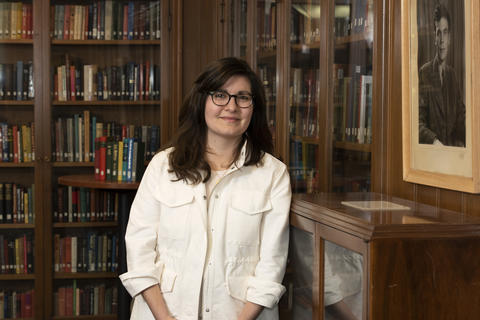When keeping up with the news gets frustrating, it may be a sign to return to high school science class.
By now, many Internet users are aware of the volume of blatant misinformation that can be found online, especially surrounding topics like health and wellness. However, the conversation becomes more complicated when trust in reputable sources wavers. What are consumers meant to do when reliable sources seem to promote conflicting ideas?
This question came to Associate Professor Rebekah Nagler while she was working on her dissertation over 10 years ago. During that time, she stumbled across a news article reporting results from a recently published study that strongly advised against the regular consumption of red wine. However, another equally trustworthy news source reported that a different research study had linked red wine to good heart health. Puzzled, Nagler observed that the product in question had not been altered, yet the information surrounding its risks and benefits seemed to change on a dime.
This conundrum of beverage consumption led her to an investigation that would steer her career for years to come.
Information Overload
As Nagler quickly found, conflicting health information extends to topics far beyond alcohol. Nearly any long standing thread of discourse surrounding nutrition and exercise has resulted in seemingly opposite scientific findings at some point along the line. This apparent conflict often has negative impacts on consumers and, in Nagler’s experience, may turn people away from fully trusting any health-related recommendations.
The methods of information consumption play as much of a role in the conflict as the health content itself. Rather than simply opening a newspaper to the section titled “Health,” or watching the news on TV, current generations are gravitating towards social media as a way of keeping up to date. The sheer volume of content on any given social media platform can be enough to confuse even the most savvy of Internet users.
Online hubs are not, however, the only sources of conflict. Nagler has found that “interpersonal conversation is also a part of it.” Conversations with friends, debates with classmates, and even home remedies for illness from your parents may be contributing to the battle over truth in the field of health.
To add even more fuel to the fire, clinical conversations add yet another layer to the conversation. Doctors, trusted sources responsible for providing accurate advice, may provide seemingly contradictory information about cancer screening tests or other health recommendations over time.
With so many voices attempting to provide accurate health facts, any person might feel lost trying to get a handle on it all. Nagler has found, over the course of her work, that consumers who feel frustrated at apparent information conflict may be unreceptive to future unrelated health campaigns. They may even turn away from campaigns regarding health topics on which evidence and experts generally agree.
Making Science Make Sense
To Nagler, one solution to solving this information challenge is reminding consumers about the scientific process. In the quest for knowledge, scientists often make discoveries that build on previous work. Thus, the state of the science evolves.
For a recent example, Nagler points to the COVID-19 pandemic. Especially within the first few months of the global event, average citizens were given a range of guidance on a number of health measures, including in which environments to wear a mask and when to get vaccinated. Nagler notes that “all of this shifting guidance was really a function of science trying to keep up with something that was changing and new.” The nature of the virus didn’t change, but experts were still learning new information daily and relaying their findings to the public.
Such a process is certainly not limited to COVID-19. As doctors and scientists continue to gain more knowledge on alcohol consumption, dietary habits, exercise regimens, cancer screening tests, and the like, so too will they continue to share their findings, even if the resulting recommendations seemingly go against the results of previous research.
Reminding people of science’s fluid nature can be a game changer. As demonstrated in her recently-published work, “Sustaining positive perceptions of science in the face of conflicting health information: An experimental test of messages about the process of scientific discovery” (Social Science & Medicine), when consumers are aware that the scientific journey involves change, they are more likely to withstand the negative effects of exposure to conflicting information. This may also mean that future health campaigns that they come across may be more likely to hit home.
Starting at the Source
Most Americans learn about the ups and downs of the scientific process sometime in school. However, many forget about the nature of experimentation as soon as they leave high school chemistry class.
Nagler posits that some alleviation of mistrust and confusion surrounding health information might be found in the K-12 system. If children are taught young that what is considered “scientific fact” might change over time, and if they are reminded of this notion as they grow up, it may be that this capacity for understanding scientific research sticks with them into adulthood.
Formal education aside, Nagler is optimistic that a well-informed next generation might remain resilient in the face of a dynamic health landscape. In the meantime, a few helpful reminders from school for the current era of Internet users might be the key to repairing trust in health research and recommendations.
By Regan Carter
